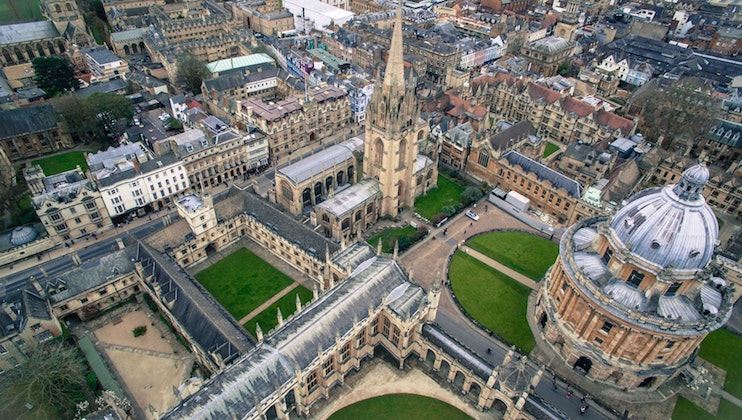5 Things You Didn’t Know About Oxford’s History
The city of dreaming spires is most commonly known for its academics, libraries and beautiful university grounds. However, down in the depths of Oxford’s history there is a wealth of fun facts and quirks that add to the city’s eclectic past. Outsmart your walking tour guide or impress at a pub quiz with our top 5 things you (probably) didn’t know about Oxford.
By Charlie Walker | Updated Feb 22 2022

The Capital City
London hasn’t always reigned supreme as the capital of England. In fact, during the English Civil War it was Oxford that served as the capital after Charles I was expelled from London by Cromwell’s Parliamentarian forces. Oxford University was a strong supporter of the Royalists and, as a result, the King lived in Christ Church College between 1642 and 1646. During Charles’ stay, Oxford colleges took on roles essential to the monarchy; St Peter’s College served as the Royal Mint, and colleges donated their gold and silver to fund the war. New College became a storage point for ammunition and weaponry and the King used Christ Church’s Great Hall as a stand-in for Parliament.
If you jump forward in time, Oxford was rumoured to have been considered again for capital city status. Researchers at Oxford’s Bodleian Library found records alluding to Hitler’s plans to invade England; the records suggested that Oxford would be Hitler’s capital should the invasion be successful. As a result, Oxford was spared the wrath of Nazi air strikes in the Second World War!

Photo credit: Chris Hall
‘Oxford Time’
Think you’re running five minutes late? Well, on ‘Oxford Time’ you’d be bang on schedule. The City of Oxford is officially 1 degree west of the prime meridian and therefore five minutes behind Greenwich Mean Time. The city acknowledges this anomaly with the ringing of the Great Tom Bell in Christ Church Cathedral. The bell rings 101 times at 9.05pm every evening. The 101 rings are in recognition of the 101 original scholars at Christchurch College, as well as homage to ‘Oxford Time’. The Great Tom is the loudest bell in Oxford, weighing six and a quarter tonnes!
Find The Great Tom Bell in Christ Church Cathedral, Christ Church College, St Aldate's, Oxford OX1 1DP.

Photo credit: Ben Abel
The Writer’s Block
Oxford is well known for its literary alumni, but it may surprise you to know that the city boasts more published authors per square mile than any other place in the world (unlucky Cambridge!). Home to some of the best-known names in literature, the streets of Oxford are littered with great literary minds. The Eagle and Child pub on St Giles street was an old haunt of J. R. R. Tolkien and C. S. Lewis. Lewis Carroll also lived and wrote in Christ Church College, Oscar Wilde was famously expelled from Madgalen and T. S. Eliot graduated from Merton. You can even wander into the botanic gardens and see the bench featured in the tragic ending of Philip Pullman’s His Dark Materials trilogy.

Photo credit: Joanna Penn
Find The Eagle and Child on 49 St Giles, Oxford OX1 3LU.
The First Public Museum
On 24 May 1683 the Ashmolean Museum became the first museum in the world to be opened to the public. The original collection was compiled by Elias Ashmole and included antique coins, books, engravings and zoological specimens - one of which was the stuffed body of the last dodo ever seen in Europe. Oxford’s first ever professor of chemistry, Robert Plot, was the first keeper of the Ashmolean museum, overseeing and maintaining the growing collections. The Ashmolean is now included in the Guinness Book of Records as the world’s first public museum and remains one of the world’s leading university museums.

Photo credit: Hans Ollerman
Find The Ashmolean Museum on Beaumont St, Oxford OX1 2PH.
The Hardest Exam in the World
All Souls College is one of Oxford’s most illusive and exclusive Oxford Colleges. None of the members are undergraduates, and admission to All Souls is subject to a first-class Oxford degree and passing ‘the hardest exam in the world’. The notoriously difficult All Souls exam has been the downfall of many starry-eyed academics; in previous years essay questions have consisted of a single word such as ‘Taste’ or ‘Water’, from which a whole essay must be constructed. Additionally, the general exam includes bafflingly thought-provoking questions such as: ‘Isn't global warming preferable to global cooling?’ (We don’t know the answer either!)
For the two candidates who do pass, the prize is certainly worth the hard work! A newly appointed fellow is given college accommodation and a £15,000 annual salary for seven years to pursue whatever academic path they choose. Many famous Oxford alumni have not quite made the grade on the All Souls exam. It is a little-known fact that T. S. Eliot applied for the All Souls fellowship to study Elizabethan dramatists and was rejected because the selection committee felt his research was ‘…far too wide for any one man to undertake, and must lead to generalisations, the value of which must be doubtful, since the foundation of knowledge on which they are based must frequently be inadequate.’ Probably a good thing he stuck to poetry!

Find All Souls College in Radcliffe Square, OX1 4AL.